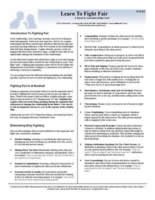All Couples Should Learn To FIght Fair. Here's How
Check out our mini-guide on how to fight fair, and stop letting badly handled conflict cause pain in your relationships. Download it NOW!
Search Our Network Of Business and Personal Development Sites
Learn to be a better negotiator from these hints and tips
On The Line
Basic Negotiating Tips By Robert Bacal
We all negotiate in our personal and professional lives. We negotiate when we go to a garage sale, or when we want to do something different at work, or when we are dealing with members of the public.
Sometimes its easy to negotiate, but other times, when we have a great deal at stake or we are upset, the task can be intimidating or difficult.
We are going to talk about some tips to effective negotiating that can help you work more effectively with your customers, co-workers, and boss. They are also applicable to other interpersonal situations.
Overview of The Negotiation Process
Negotiating is the process by which two or more parties with different needs and goals work to find a mutually acceptable solution to an issue. Because negotiating is an inter-personal process, each negotiating situation is different, and influenced by each party's skills, attitudes and style. We often look at negotiating as unpleasant, because it implies conflict, but negotiating need not be characterized by bad feelings, or angry behaviour. Understanding more about the negotiation process allows us to manage our negotiations with confidence increases the chance that the outcomes will be positive for both parties.
Barriers To Successful Negotiation
Viewing Negotiation As Confrontational
Negotiation need not be confrontational. In fact effective negotiation is characterized by the parties working together to find a solution, rather than each party trying to WIN the contest of wills. Keep in mind that the attitude that you take in negotiation (eg. hostile, cooperative) will set the tone for the interaction. If you are confrontational, you will have a fight on your hands.Trying To Win At All Costs
If you "win" there must be a loser, and that can create more difficulty down the road. The best perspective in negotiation is to try to find a solution where both parties "win". Try not to view negotiation as a contest that must be won.
Becoming Emotional
It's normal to become emotional during negotiation that is important. However, as we get more emotional, we are less able to channel our negotiating behaviour in constructive ways. It is important to maintain control.
Not Trying To Understand The Other Person
Since we are trying to find a solution acceptable to both parties, we need to understand the other person's needs, and wants with respect to the issue. If we don't know what the person needs or wants, we will be unable to negotiate properly. Often, when we take the time to find out about the other person, we discover that there is no significant disagreement.
Focusing On Personalities, Not Issues
Particularly with people we don't like much, we have a tendency to get off track by focusing on how difficult or obnoxious the person seems. Once this happens, effective negotiation is impossible. It is important to stick to the issues, and put aside our degree of like or dislike for the individual.
Blaming The Other Person
In any conflict or negotiation, each party contributes, for better or worse. If you blame the other person for the difficulty you will create an angry situation. If you take responsibility for the problem, you will create a spirit of cooperation.
Some Negotiation Tips
Solicit The Other's Perspective
In a negotiating situation use questions to find out what the other person's concerns and needs might be. You might try:
What do you need from me on this?
What are your concerns about what I am suggesting / asking?
When you hear the other person express their needs or concerns, use listening responses to make sure you heard correctly.
For example: So, you are saying that you are worried that you will get lost in the shuffle and we will forget about you...Is that right?
If I have this right, you want to make sure that the phones are covered over lunch?
State Your Needs
The other person needs to know what you need. It is important to state not only what you need but why you need it. Often disagreement may exist regarding the method for solving an issue, but not about the overall goal.
For example:
I would like an hour on Tuesday to go to the doctor. I want to make sure I am healthy so I can contribute better to the organization.
Prepare Options Beforehand
Before entering into a negotiating session, prepare some options that you can suggest if your preferred solution is not acceptable. Anticipate why the other person may resist your suggestion, and be prepared to counter with an alternative.Don't Argue
Negotiating is about finding solutions...Arguing is about trying to prove the other person wrong. We know that when negotiating turns into each party trying to prove the other one wrong, no progress gets made. Don't waste time arguing. If you disagree with something state your disagreement in a gentle but assertive way. Don't demean the other person or get into a power struggle.
Consider Timing
There are good times to negotiate and bad times. Bad times include those situations where there is:
- . a high degree of anger on either side
- . preoccupation with something else
- . a high level of stress
- . tiredness on one side or the other
Time negotiations to avoid these times. If they arise during negotiations a time-out/rest period is in order, or perhaps rescheduling to a better time.
Conclusion
Negotiating is a complex process but one worth mastering. If you keep in mind that you are responsible for the success or failure of negotiation, and if you follow the tips above, you will find the process easier.
 Manage Conflict - Resolve Conflict - Prevent Conflict
Manage Conflict - Resolve Conflict - Prevent Conflict 

